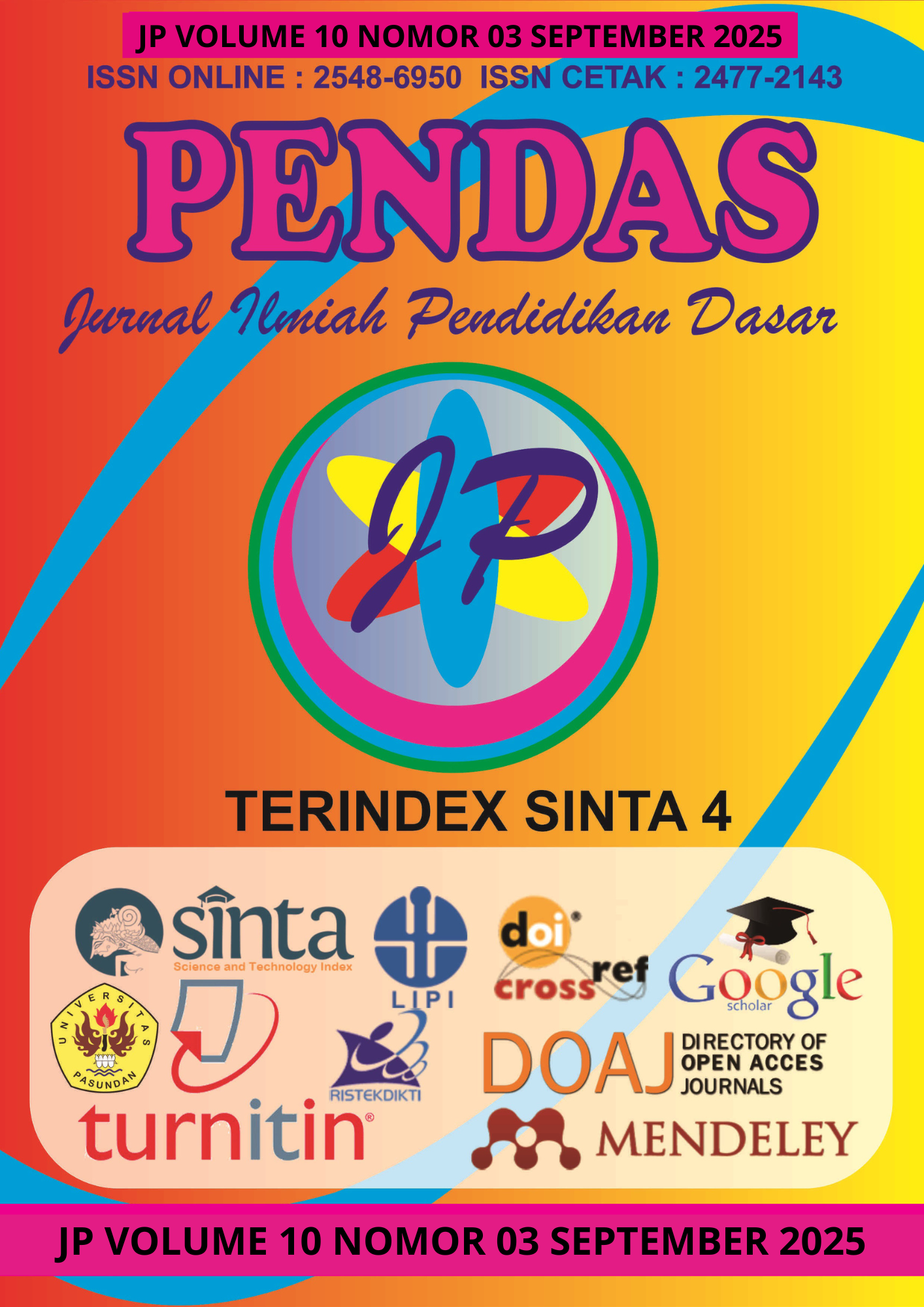PENGEMBANGAN LKPD BERBASIS PROBLEM BASED LEARNING (PBL) UNTUK MENINGKATKAN BERPIKIR KRITIS PESERTA DIDIK PADA MATA PELAJARAN MATEMATIKA KELAS II SEKOLAH DASAR
DOI:
https://doi.org/10.23969/jp.v10i3.28339Keywords:
flat shapes, critical thinking, LKPD, problem based learning, elementary schoolAbstract
This study aims to develop and test the effectiveness of Problem Based Learning (PBL) based Learner Worksheet (LKPD) in improving critical thinking skills of grade II elementary school students on flat building material. The research was conducted at SDN 2 Sawah Lama with 25 students as subjects. The research method used is Research and Development (R&D) with the ADDIE model which includes analysis, design, development, implementation, and evaluation stages. The evaluation instrument was in the form of pretest and posttest with a total of 18 items (10 multiple choice, 5 essays, and 3 fillings), which were analyzed statistically through paired sample t-test. The validation results showed that the LKPD was declared very valid by the experts. Analysis of learning outcomes showed a significant increase in critical thinking skills, indicated by the average pretest score of 53.2 and posttest of 82.1 (p < 0.05). In addition, there was an increase in the ability category from “low” and “sufficient” to “good” and “very good” in most students. This finding shows that the application of PBL-based LKPD is not only effective in improving learning outcomes, but also able to foster critical thinking skills since elementary school level. This model is very relevant to the project-based learning approach and the strengthening of the Pancasila Student Profile in the Merdeka Curriculum.
Downloads
References
Branch, R. M. (2009). Instructional design: The ADDIE approach. Springer.
Facione, P. A. (2020). Critical thinking: What it is and why it counts (2020 update). Insight Assessment.
Kementerian Pendidikan, Kebudayaan, Riset, dan Teknologi. (2022). Panduan penguatan profil pelajar Pancasila melalui pembelajaran berbasis projek. Kemendikbudristek.
Lestari, S., & Pramuditya, T. (2021). Pengaruh pendekatan kontekstual terhadap pemahaman konsep bangun datar pada siswa sekolah dasar. Jurnal Ilmiah Pendidikan Dasar, 8(2), 145–155.
Mulyadi, R., & Ningsih, D. (2023). Pengembangan LKPD berbasis masalah untuk meningkatkan kemampuan berpikir kritis siswa SD. Jurnal Pendidikan Inovatif, 5(1), 34–42.
Novitasari, R., & Rachmadiarti, F. (2020). Pengaruh penggunaan LKPD berbasis problem solving terhadap keaktifan dan hasil belajar siswa kelas rendah. Jurnal Pendidikan Dasar Nusantara, 6(1), 21–30.
Putra, A., & Widodo, A. (2023). Inovasi bahan ajar tematik berbasis pendekatan saintifik untuk pembelajaran SD. Jurnal Pendidikan Dasar Indonesia, 9(2), 55–66.
Rahman, H., Sulastri, E., & Kurniawan, D. (2021). Analisis kebutuhan pengembangan bahan ajar matematika di kelas rendah. Jurnal Cakrawala Pendidikan Dasar, 3(3), 205–213.
Sari, L. M., & Prasetyo, Z. K. (2022). Efektivitas LKPD interaktif dalam pembelajaran matematika di kelas awal. Jurnal Inovasi Pendidikan Dasar, 7(1), 77–88.
Saputra, R. D., & Hidayat, R. (2022). Problem Based Learning dalam meningkatkan kemampuan berpikir kritis siswa. Jurnal Ilmiah Sekolah Dasar, 6(2), 89–98.
Suparman, A., Cahyani, A., & Roesminingsih, M. V. (2023). Pendekatan pedagogi cerita dan visualisasi untuk anak usia dini. Jurnal Pendidikan Anak Usia Dini, 8(1), 14–23.
Susanto, H., & Ramdani, R. (2024). Pembelajaran berdiferensiasi dalam Kurikulum Merdeka: Implikasi bagi guru sekolah dasar. Jurnal Kurikulum dan Pembelajaran, 12(1), 1–10.
Trilling, B., & Fadel, C. (2020). 21st century skills: Learning for life in our times. Jossey-Bass.
Wulandari, R., & Wijayanti, A. (2021). Strategi meningkatkan keterampilan berpikir kritis siswa SD melalui pendekatan PBL. Jurnal Pendidikan Dasar dan Humaniora, 9(2), 112–119.
Downloads
Published
Issue
Section
License
Copyright (c) 2025 Pendas : Jurnal Ilmiah Pendidikan Dasar

This work is licensed under a Creative Commons Attribution 4.0 International License.














































